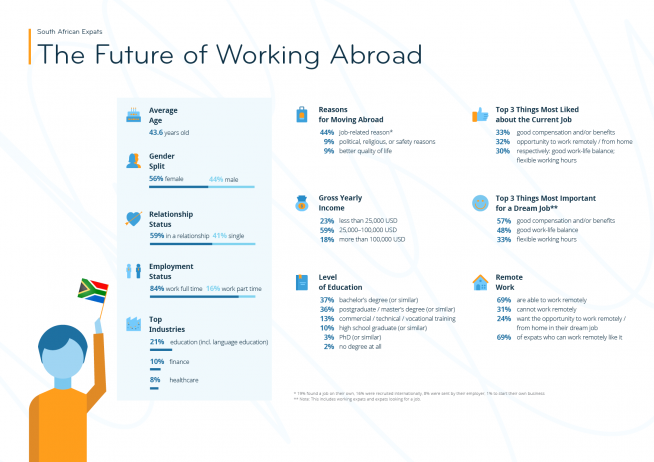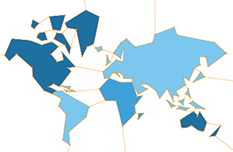South African Expats Are Very Likely to Work in Education
Why do South Africans move abroad? According to the Expat Insider 2021 survey by InterNations, 44% of South Africans working abroad name their career as the most important reason for relocating to another country. Most of them found a job on their own (19%) or were recruited internationally (16%). Just 8% were sent abroad by their employer, which is a smaller share than the global average among expats working abroad (13%), and only 1% moved abroad to start their own business. Aside from work-related reasons, an above-average share of South Africans working abroad originally relocated for political, religious, or safety reasons (9% vs. 2% globally) or because they were looking for a better quality of life (9% vs. 6% globally).
The Typical South African Expat Working Abroad
On average, South African expats working abroad are 43.6 years old, and more than half are female (56%). This is ten percentage points more than the global average, where 46% of working expats are women. Similar to the global average, 84% of South African expats work full time (vs. 82% globally).
When it comes to education, South African expats have a lower level of formal education than the average expat working abroad. Just 36% of South Africans have a postgraduate/master’s degree (vs. 47% globally), and only 3% hold a PhD (vs. 8% globally). However, close to two in five (37%) have a bachelor’s degree, compared to 33% globally. Lastly, an above-average share each says that they have either completed commercial/technical/vocational training (13% vs. 6% globally) or graduated from high school (10% vs. 5% globally) as their highest level of academic or professional qualifications. One in fifty (2%) also has no degree at all, compared to 1% globally.
South African Expats Are Educators, Not Executives
This lower level of formal qualifications could be a contributing factor as to why South African expats are less likely to work in senior positions. Just one-quarter (25%) works in a senior or specialist role (vs. 30% globally), and only 9% are top managers / executives (vs. 13% globally). However, another reason might be the very high share of South African expats being teachers/professors: close to one in five (19%) describe their current employment situation that way (vs. 9% globally).
In fact, 21% state they work in the field of education, which is nine percentage points more than the global average (12%) and by far the most common field of work among South Africans. It is followed by 10% working in finance and another 8% in healthcare. While globally many expats also work in IT (11%), this is just the case for 6% of expats from South Africa.
South African Expats Are Happy with the State of the Local Economy Abroad
More than two-thirds of South African expats (67%) are satisfied with their job in general, which is, however, six percentage points below the global average (73%). It looks like they are mainly dissatisfied with their job security (63% happy vs. 67% globally) and their working hours (67% happy vs. 70% globally).
On the other hand, 49% of expats from South Africa rate their local career opportunities positively, which is the same as the global average (49%). And they are even happier than the average expat with their work-life balance (70% happy vs. 68% globally) and the state of the local economy in their current country of residence (70% happy vs. 65% globally).
In fact, several out of the top 5 most common destinations for South Africans working abroad rank among the top 10 worldwide for the state of the local economy: Switzerland comes 4th, followed by Germany (7th) and the Netherlands (10th). Australia still lands in a good 14th place, while the UK only comes 35th. However, this is still far ahead of South Africa, whose state of the local economy is voted the worst in the world by expats living there (59th out of 59).
A Good Compensation: A Highlight Now, an Important Factor in the Future
When asked what they like best about their current job, the top response given by South Africans working abroad is a good compensation and/or good benefits (33%). The share of South African expats citing this aspect is even five percentage points higher than the global average (28%).
In fact, more than half the South African expats working abroad (51%) have a gross yearly income ranging from 50,000 to 150,000 USD (vs. 45% globally). While another 44% make up to 50,000 USD per year, which is on par with the global average (44%), only 5% make 150,000 USD or more. This is a considerably smaller share than the global average (11%).
A good compensation and/or good benefits is also the most frequently mentioned aspect when South African expats are asked to imagine their dream job: close to three in five (57%) name this factor, which is slightly above the global average (54%).
Working Remotely Is Not So Common among South Africans
More than three in ten South African expats (32%) also name the opportunity to work remotely / from home as a highlight of their current job, making it the second most cited aspect. In fact, 69% of those who can work remotely actually like doing so (vs. 65% globally). However, South African expats are a lot less likely to be able to work remotely than expats worldwide: close to seven in ten (69%) say that they can work remotely, compared to 78% globally. More than one in five (21%) are unable to work remotely due to the nature of their job (vs. 16% globally), and 10% cannot work remotely because their employer does not allow it (vs. 6% globally).
The COVID-19 pandemic has had an impact on the remote work policies for some South African expats, though: 20% say that remote work was newly introduced and is here to stay, and another 27% are able to work remotely more often than before COVID-19. However, 31% also share that their remote work policy has not changed in the long run, while this is just the case for 26% of expats worldwide. Considering that many South African expats work in the field of education, this might not be much of a surprise.
When they are asked to imagine their dream job, the opportunity to work remotely / from home is also not particularly important for South African expats. Not even a quarter (24%) name this aspect.
Personal Growth Is More Important than General Career Development
So, what is important to South Africans working abroad when they envision their professional future? The top aspect (a good compensation and/or good benefits) is followed by a good work-life balance (48%) and flexible working hours (33%).
Interestingly, while 25% of South Africans want to have some room for personal development / growth in their dream job, just 15% find their general career development important. Globally, 20% of expats worldwide name their general career development as an important aspect, while 22% find room for personal development / growth important.
“When it comes to the future of working abroad, it is clear that South African expats are not willing to sacrifice their personal life for their career,” says Malte Zeeck, InterNations Founder and Co-CEO. “Together with other factors like autonomy, freedom, creativity, and self-fulfillment, the wish for personal growth is closely related to the concept of New Work. This concept describes a new way of working in the global and digital age.”
South African Expats Find Modern Approaches to Work Abroad
More than half the South African expats working abroad (54%) say that the concept of New Work is more important in the business culture of the country they now live in than in South Africa. On a global scale, just 49% of expats say the same when comparing their respective host and home countries.
In fact, four out of the five most common destinations for South Africans working abroad rank ahead of South Africa when it comes to expats comparing the importance of New Work in the local business culture. The Netherlands (5th) and Australia (7th) even land among the top 10 worldwide, followed by the United Kingdom (15th) and Switzerland (23rd). South Africa then lands in 32nd place, while Germany comes 35th.
For example, 76% of expats living in the Netherlands say that New Work is important in the local business culture, while just 53% of expats in South Africa agree.




